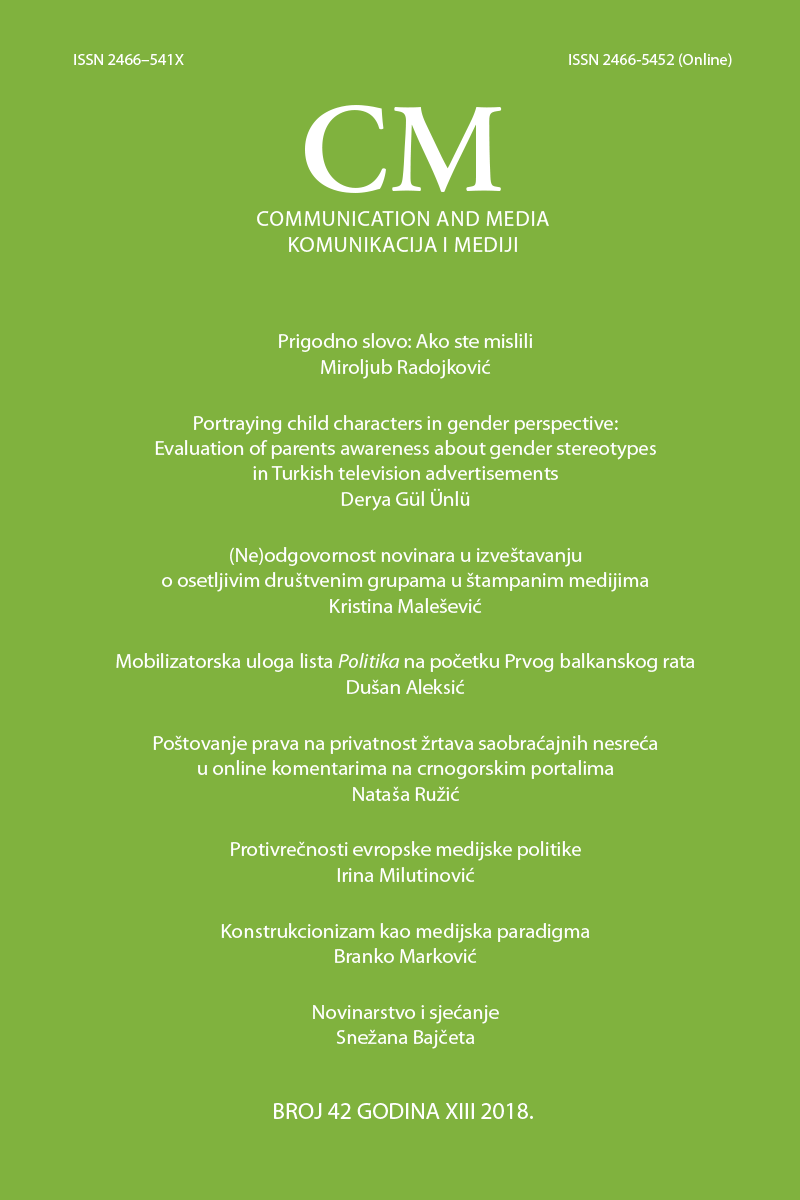CONSTRUCTIONISM AS A MEDIA PARADIGM
Abstract
Research of the nature of mass communication by using different theoretical approaches has gone a long way since its perception as a transmission of symbolic content (whose aim is to create certain effect used for confirming or questioning social order) to the construction of symbolic or media reality. The media simultaneously create reality through symbolic legitimization, which does not eliminate the possibility of their planned impact on the audience. In this case, the intentionality of the media appears as long-term product of their significant role with a completely uncertain outcome. Namely, interpretative frameworks whose bearers are social institutions, organizations, interest groups, political parties and individuals create numerous definitions of reality reproduced by symbolic activity of the media in the processes of legitimization and delegitimization. In these terms, according to Hall, the media are secondary definers, whereas the leading social institutions and organizations are primary definers of reality (Hall, 1978:57). The confrontation between different definitions of reality always actualizes the issue of power, as well as the media conditions in which they are implemented. Thus, mass media appear as an infrastructure for the objectivization of different presentations through the process of creating symbolic construction. Aside from constructing reality, the media are part of that reality as well. Perceiving media reality as the result of specific form of management and production of meaning is a shift in the perception of the media in society. The mass media practice is thus not observed from the aspect of message transfer, but as a process of producing meaning in marking reality. In this way, media contents offer reference and interpretative frameworks for interpreting actual events and in some cases, they replace them.
Copyright
Authors retain copyright of the published papers and grant to the publisher the non-exclusive right to publish the article, to be cited as its original publisher in case of reuse, and to distribute it in all forms and media.
Licensing
The published articles will be distributed under the Creative Commons Attribution ShareAlike 4.0 International license (CC BY-SA). It is allowed to copy and redistribute the material in any medium or format, and remix, transform, and build upon it for any purpose, even commercially, as long as appropriate credit is given to the original author(s), a link to the license is provided, it is indicated if changes were made and the new work is distributed under the same license as the original.
Users are required to provide full bibliographic description of the original publication (authors, article title, journal title, volume, issue, pages), as well as its DOI code. In electronic publishing, users are also required to link the content with both the original article published in CM: Communication and Media and the licence used.
Authors are able to enter into separate, additional contractual arrangements for the non-exclusive distribution of the journal's published version of the work (e.g., post it to an institutional repository or publish it in a book), with an acknowledgement of its initial publication in this journal.
Self-archiving policy
Authors are permitted to deposit author’s publisher's version (PDF) of their work in an institutional repository, subject-based repository, author's personal website (including social networking sites, such as ResearchGate, Academia.edu, etc.), at any time after publication.
Full bibliographic information (authors, article title, journal title, volume, issue, pages) about the original publication must be provided and links must be made to the article's DOI and the license.
Disclaimer
The views expressed in the published works do not express the views of the Editors and the Editorial Staff. The authors take legal and moral responsibility for the ideas expressed in the articles. Publisher shall have no liability in the event of issuance of any claims for damages. The Publisher will not be held legally responsible should there be any claims for compensation.

